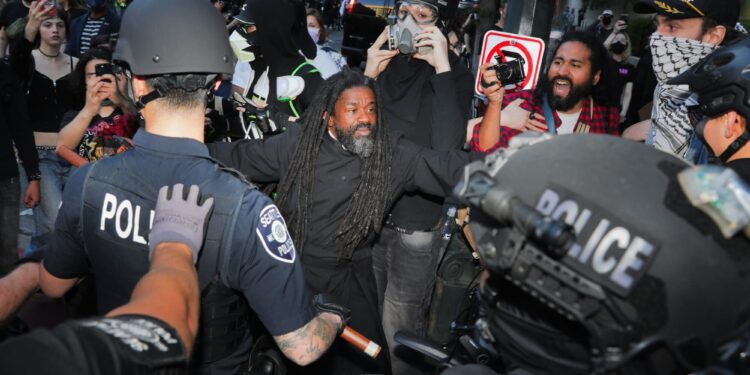Seattle City Hall became the center of a highly charged confrontation between evangelical rally participants and LGBTQ+ counter-protesters, resulting in clashes that drew sharp criticism of the city’s handling of the situation. The protest began as an evangelical event promoting conservative religious values but quickly escalated when counter-protesters arrived to voice their opposition. The Seattle Police Department was called in to manage the growing tension, but their response sparked widespread debate about law enforcement effectiveness and public safety.
Eyewitness reports and video footage from the event reveal that the situation became increasingly volatile as both groups engaged in heated exchanges, with some physical altercations occurring despite police presence. Critics of the Seattle Police Department argue that officers were unprepared and hesitant, failing to adequately control the crowd or prevent clashes. This perceived lack of decisive action raised questions about the city’s ability to handle protests that involve deeply divisive social and political issues.
The controversy intensified when the FBI deputy director publicly criticized Seattle’s response, underscoring concerns about the city’s protest management strategies. The federal official emphasized the necessity for clear, robust policing protocols to maintain order during politically sensitive demonstrations. This rare intervention from a high-ranking federal law enforcement official highlighted the gravity of the situation and the need for improved coordination and preparedness.
The incident has ignited a broader discussion about Seattle’s approach to balancing free speech rights with public safety. Members of the LGBTQ+ community and their allies expressed disappointment over what they viewed as insufficient police protection during the counter-protest, fearing for their safety amid the clashes. Conversely, supporters of the evangelical rally accused authorities of bias and inadequate safeguarding against harassment. This event reflects ongoing societal divisions and challenges faced by city officials in managing public demonstrations fairly and effectively.
In response to the fallout, Seattle city officials have pledged to review and update police protocols, aiming to enhance law enforcement readiness and ensure impartial enforcement of laws during future protests. The objective is to protect all citizens’ rights to assemble peacefully while minimizing the risk of violence. This confrontation at Seattle City Hall stands as a pivotal moment in the national conversation about protest policing, civil liberties, and the complex dynamics between law enforcement and diverse community groups.
As Seattle continues to address the repercussions of this protest clash, local communities, activists, and government leaders remain engaged in dialogue about the best ways to foster safe, respectful public discourse. The city’s handling of this incident will likely influence future policies on protest management and community relations, shaping the balance between protecting democratic freedoms and maintaining public order in an increasingly polarized environment.
This detailed report offers insights into the complexities of protest management in Seattle and highlights the critical need for strategic improvements in law enforcement approaches to uphold safety and civil rights. For ongoing updates and in-depth coverage of Seattle’s public safety and community relations, stay tuned to trusted local news sources and official city communications.







